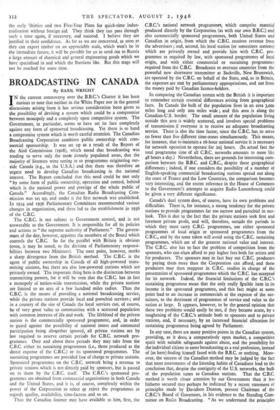ANGLO-RUSSIAN TRADE
By M. PHILIPS PRICE, M.P.
MILE negotiations now in progress of the Russian Trade Delega-
tion in London have aroused fresh interest in the prospects of Anglo-Russian trade. Since Russia is normally a great exporter of raw materials and we of engineering goods, the problem of reviving trade would appear to be fairly easy. In fact the difficulties are considerable. First there is the problem of clearing up the outstand- ing balances of wartime transactions. During the war we delivered a considerable quantity of munitions and war stores, some under lease-lend and some on a commercial basis, in return for Russian produce and timber. We have not been able to agree the prices for the balance of these transactions. One must hope that it will soon be possible to do this, so that the ground can be cleared for a long- term trade agreement. But even if the war-time arrangements can be satisfactorily disposed of, there are formidable difficulties in the way of the larger deal.
I got some idea of them when I travelled down last year from Moscow to the Ukraine and across Central Russia to the Caucasus. It was not till I got to a point 1,200 miles from Moscow that I saw a railway station and a locomotive shed that was not in ruins. All the while. that I was travelling down to Kiev from Moscow, lumber trains were pouring South from the forest areas of the North and Finland. It was in fact clear that home consumption to replace war damage was dominating the whole economy of the country, and that the prospects of surpluses for export were very thin. In the Ukraine I was informed that half a million houses had been completely destroyed in the villages, and about 550,000 in the towns. Very little reconstruction had been done by last autumn, because the Government had very properly decided to get the construction indus- tries going first, and to produce cement, bricks and steel in sufficient quantities for permanent structures rather than invest in temporary buildings. The capital investment needed in the coal, iron, steel, oil, .general engineering and textile industries to make good the destruc- tion of the war is enormous. Various commissariats for capital reconstruction were set up during 1945 and early 1946 to take on this special job. They have had first call on skilled labour and material. The result is that, whatever the increase in national income is, more than half of it will go to capital and not to consumer goods. The tendency of Russian economy for some time to come would therefore be to import rather than export provided there were no financial and political hindrances to this.
The condition of agriculture is the same in essence as that of industry. The best land of European Russia is the Ukraine, which has been devastated worse than any other part of the country. Of the 9o,000 tractors operating there before the war only a fraction are now in use. It is probable that only 15 per cent. of the pre-war head of cattle are now in the Ukraine. Colle,ctive herds are being slowly rebuilt by State purchase of livestock from the undamaged Eastern territories and some reparations stock. There is a big drive to deliver tractors to the Ukraine which, no doubt, in time will have the desired effect. For the whole collective-farm system of Russia is linked up with mechanised agriculture. The re-establishment, therefore, of agriculture in the Ukraine is virtually dependent on the campaign to 'get the metallurgical industries going in the Don and the Donetz basins. For my part I saw little evidence anywhere in Russia that land had gone out of cultivation. I doubt if even in the Ukraine more than zo per cent, of the land has become disused. On the other-hand yields have fallen. I doubt if the harvest of 1945 was more than 6o ner cent. of the pre-war. Moreover, the absence
of sufficient livestock will affect soil fertility in all areas other than the black-earth zone. In general it may be said that it will take at least five years before Ukrainian agriculture is brought back to its pre-war level. The same applies to White Russia and the Cossacx lands of the Don. The North Caucasus is less affected, and Western Siberia and the lower Volga provinces have on balance raised the area of cultivation, though not the yield per acre.
All, these facts have an important bearing on the prospect of Russia being able to engage in foreign trade once more. For the great capital-reconstruction drive that is slowly beginning will inevit- ably mean that there will be an enormous demand within the country for the raw material which she formerly exported. She will need all the cereals that she can produce at home. Barter arrangements can no doubt be made with some of the border States for some ex- ports and, of course, small " propaganda " lots may be sent to France. But she will not be exporting oil for some time to come. The output of the Caucasus oilfields has fallen heavily, not through lack of supplies but through worn-out machinery and the difficulty of get- ting replacements, spare parts and new boring machinery. A big drive was going on when I was in Baku to raise the output of the oilfield.
There remains the only article that Russia can easily export— timber. Here the prospects are brighter, but still there are diffi- culties. During the war timber-production fell zo per cent. below the pre-war figure. But, owing to the need to rebuild the devastated areas, the home demand has now become so great that there will be little left for export. The " Gosplan " (Department of Economic Planning) has zoned the timber resources of Russia with a view to economising in transport. The timber from the whole of the central forest region stretching from the north of Moscow to the White Sea and eastwards to the Urals is to go by rail and Volga transport to the Ukraine and South Russia. The areas left for export, then, are the forests of the • Petchora, just west of the Urals and Western Siberia. It is thought that it will be possible to ship this by Arctic waters to some port of transhipment on the White Sea, where ocean- going vessels can take over. The forest resources of Western and Central Siberia are enormous, and the Soviet authorities are talking of extensive logging operations as far east as the Ankara River, a tributary of the Yenesei. There are, however, technical difficulties of lumbering in these regions.
Some Soviet authorities talk of turning out some 250,000 cubic metres of timber a year for the whole country almost at once. This will require on their own figures 1,2oo,000 workers lumbering in the old style with horses, axes and hand-saws ; but that figure cannot possibly be produced by these methods. It might be possible if American power-saws could be used, but it has been found that in practice they are not suitable for Russian conditions. Overhead costs are too high, because in the Russian forests the trees are smaller and farther apart. A Russian engineer is, however, working on an adaptation of the American power-saw to suit Russian conditions. But this has as yet to be tried out on an extensive scale. Therefore, there is still uncertainty about the prospects of extensive timber exports from Russia in the immediate future, although after a while this is the export article which is the most likely to get going.
The only way to open up rapidly economic relations between Russia and the West is by credits. But here at once we enter the sphere of politics. Difficulties present themselves. First of all, we are, of course, unable to give credits, while the American Congress in its present mood of irresponsibility may think that this would be a good opportunity to impose political conditions on the Soviet Union. The Russians have their own ideological world, and economic difficulties will not make them endanger it by accepting political conditions for a foreign lOan. For instance, they will never agree to the American idea of uncontrolled private enterprise operating either
in Russia or even in the States bordering Russia. They know that kind of thing has led to political influence in the past, and was the
economic basis of the cordon sanitaire of the inter-war years. They will not permit the undermining of their controlled internal economy, nor for that matter will they relax under foreign pressure the hold the State has at present over publicity and public opinion.
The Russians are a tough people and have survived the convulsions of the forcible collectivisation of the second agrarian revolution in the early 'thirties and two Five-Year Plans for quick-time indus- trialisation without foreign aid. They think they can pass through such a time again, if necessary, and succeed. I believe they are justified in their confidence. As fat as we are concerned, as soon as they can export timber on an appreciable scale, which won't be in the immediate future, it will be possible for us to send out to-Russia a large amount of electrical and general engineering goods which we have specialised in and which the Russians like. But this stage will not be reached for some time.



























 Previous page
Previous page